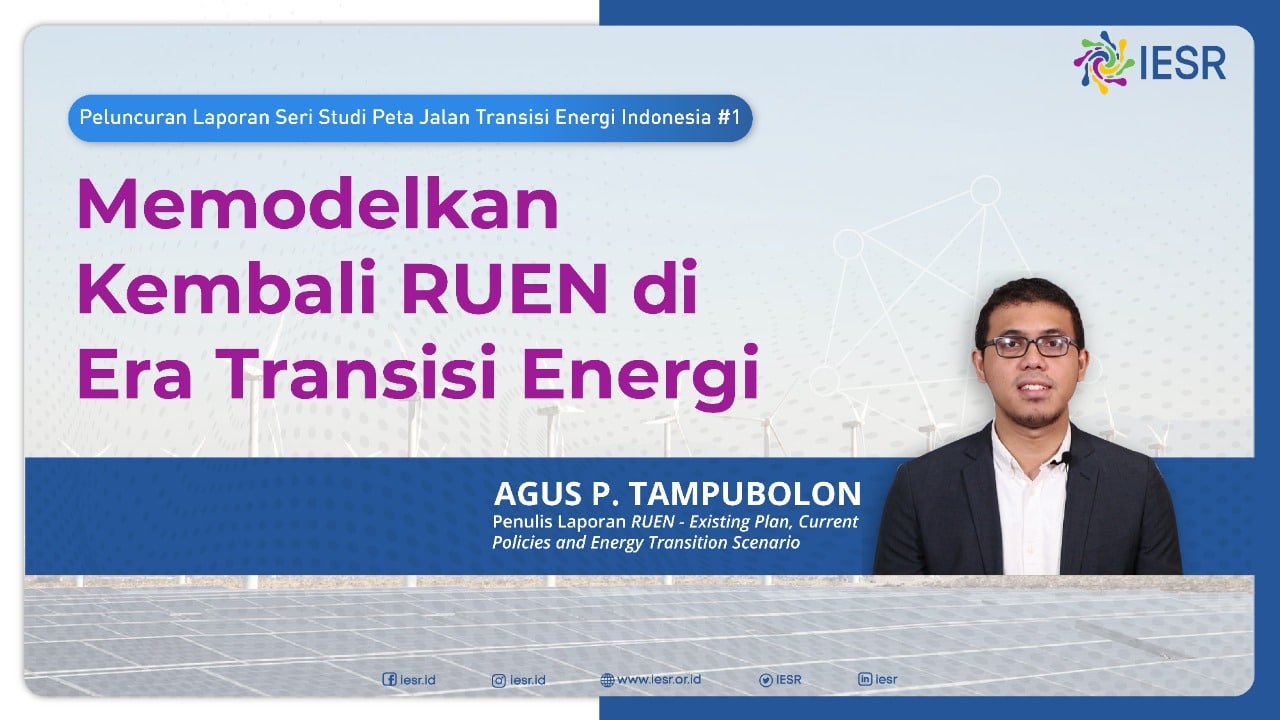Reviewing the National Energy Plan 2017, is it still relevant in the energy transition era?
Jakarta, Tuesday, September 28, 2020 – “Climate change is becoming a real threat, and escalates quickly, with the rapid technological developments, especially in the field of renewable energy technology, is an important factor for countries in the world starting their energy transition,” explained Fabby Tumiwa, Director of the Institute for Essential. Services Reform (IESR) during the opening of the online launch of the Indonesian Energy Transition Roadmap Study Series report. Participating at the event as a panelist, Sugeng Mujiyanto, Head of the Bureau of Energy Policy Facilitation and National Energy Council Trial (DEN) and Saleh Abdurrahman, Expert Staff for Environment and Spatial Planning, Secretariat General of the Ministry of Energy and Mineral Resources.
“The use of renewable energy, which has become a priority for the development and utilization of national energy in the National Energy Policy (KEN), has not been reflected in the achievement of the National Energy General Plan (RUEN) until 2020. Apart from ambitious targets, several indicators and assumptions used to model the supply and demand energy in RUEN were built based on data and information in 2015. In fact, in the last five years, indicators and assumptions from socio-economic, techno-economic experiencing significant development, “he said.
This becomes the background for IESR to conduct further studies summarized in the Study Series Report on the Roadmap for Indonesia’s Energy Transition. The aim is to encourage Indonesia to be more prepared, not left behind, so many sectors such as economic, social, and even environmental fields do not have to suffer in the long run.
This report contains five thematic studies on the road map for Indonesia’s energy transition, which begins with National Energy Plan (RUEN): Existing Plan, Current Policies Implication, and Energy Transition Scenario written by Agus Praditya Tampubolon.
Agus reviewed the 2017’s RUEN through three scenarios (realization scenario, current policy, and energy transition) to evaluate and project the initial RUEN targets’ achievements.
“The 2017 RUEN uses 2000-2015 data to project 2016-2050 data. The findings are in the realization scenario; it turns out that primary energy consumption is lower than RUEN. The electricity consumption is also smaller, RUEN targets 2500 KWh per capita in 2025, while what will happen is only 1582 kWh per capita, “Agus explained.
Agus continued that with this pattern, RUEN’s renewable energy target of 45.2 GW in 2025 would not be achieved, but only 22.65 GW instead.
He combines several policies, such as identifying city networks, electric vehicles, and biodiesel, to project RUEN targets in the latest policy scenario. As a result, RUEN’s primary energy mix in 2025, which was initially 15%, increased to 18%.
“And in 2050, the increase will be even more drastic, not 23% but 40.3%. This is far from the target scenario RUEN and the projection target of the realization scenario, “he said.
Furthermore, Agus explained that he uses the parameter of limiting the construction of coal-fired power plants in the energy transition scenario. As a result, the share of renewable energy in RUEN’s prime energy mix is 18%, increasing to 20% in 2025.
“There will be an increase around 66-69%, by the year 2050,” he explained.
Starting from the findings he dissected, IESR recommended three crucial points for the government. First, reviewing the parameters and assumptions of RUEN 2015-2050. Second, increasing the share of renewable energy in line with reducing fossil energy. One of the ways is by reducing coal power plants. Third, propose a study on developing alternative scenarios in the national energy supply plan that integrates a larger portion of renewable energy.
Responding to the IESR reports and recommendations results, Sugeng thought that although his party always reviewed the RUEN every year, a re-review of the RUEN would be carried out if there were urgent conditions.
“For example, we saw on TV recently, as a result of COVID-19, the President Director of Pertamina stated that the demand for fuel decreased by around 25-26%. This is significant. If this happens continuously, we must also examine (RUEN), “he explained.
Meanwhile, Saleh said he was interested in IESR’s recommendations regarding alternative energy transition scenarios.
“The IESR energy transition scenario is undoubtedly a useful input. We don’t want to depend on fossil energy all the time, so I think there is still enough time to prepare. I want IESR to continue to enrich us in our ways so that the energy transition can also produce a sustainable economic transition with higher added value, “he said.
Download the full report of the study here:
RUEN – Existing Plan, Current policies, and Energy Transition Scenario

